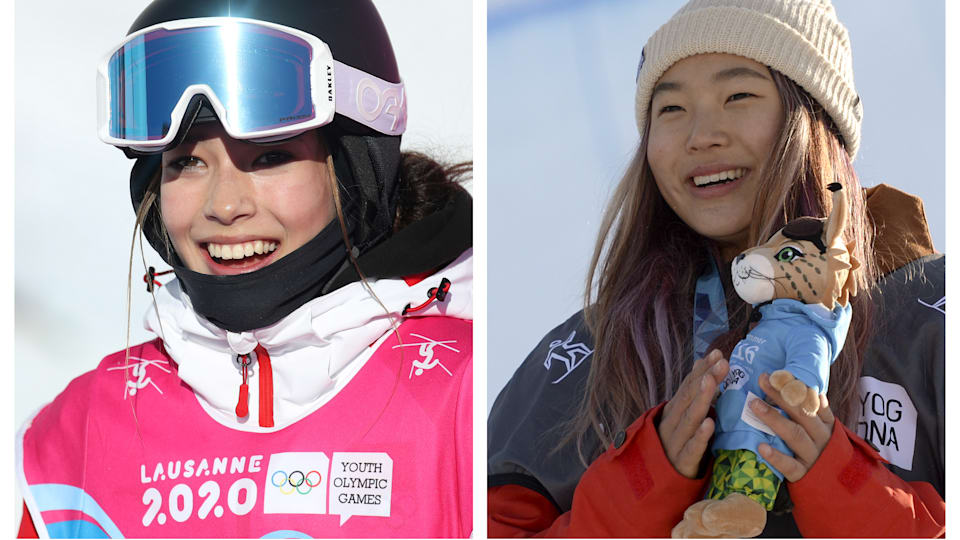How Chloe Kim, Eileen Gu used Winter Youth Olympic Games as springboard for success
Athletes are given a taste of what Olympic life is like from the increased pressure to extra media attention, and many YOG gold medallists will be in action at Beijing 2022.

Ever since its first edition in 2012, the Winter Youth Olympic Games (YOG) have served as a key stepping stone for the likes of Chloe Kim and Eileen Gu to become stars of their sports.
The athletes get a taste of what competing at a Winter Olympics is like, from the pressure of competing against the best talent in the world, to dealing with increased media presence, and living in the athlete’s village with your national teammates.The Beijing 2022 Games, which begin this February, will see many YOG gold medallists in action.
Take USA shredder Kim for example, who won halfpipe Olympic gold at PyeongChang 2018 and secured the highest snowboarding score in history en route to two titles at the 2016 YOG in Lillehammer.
“The experience of the Youth Olympic Games is very useful, as it gives you a better idea of what the Winter Games will be like,” she told Olympics.com.
More recently, US-based Chinese freestyle skier Eileen Gu, one of the stars of the Lausanne 2020 YOG, spoke about her experience, where she won gold in both halfpipe and big air, plus a silver in slopestyle.
“It was my first time competing in three events and really having to juggle training and competition back-to-back,” she said. “And so, dealing with that pressure consistently for a week straight, I think it taught me a lot. Learning to handle pressure is probably one of the biggest things an athlete has to do. And I think the Youth Olympic Games definitely prepared me for that.”
At the Innsbruck 2012 YOG, Austrian skier Marco Schwarz won three gold medals aged just 16, before going on to become one of today’s Alpine skiing stars.
“I learnt a lot from those Youth Olympic Games,” he said. “It’s difficult to concentrate when you take part in such an important event. I was 16 and it was the first time I had so much media attention. That helped me a lot for my future career. I learnt to focus on the most important things and not to have too many expectations. After Innsbruck 2012, my career really took off. So it was really the start of my career, I would say. After Innsbruck, I joined the Austrian Ski Federation team. Then I started with the Europa Cup races. And a year later, I made my World Cup debut.”
At the same YOG edition, speed skater Suzanne Schulting from the Netherlands, who won gold in the 1,000m at PyeongChang 2018, managed both to push her limits and enjoy the occasion.
““It was just really fun,” she said. “I really tried to do my best, but it was all about fun, for sure. For my whole life, I have combined long track and short track. At those Games, I was able to do short track and also able to do long track, and I thought, ‘Okay, I think I can do better at long track.’ So, I made my decision to do long track. You’re super young, so you’re just excited to do everything.”
Andreas Wellinger is another former YOG athlete who has reached the pinnacle of Olympic sport, in every sense of the word. This German ski jumper, who won individual gold and silver medals plus a men’s team silver medal at PyeongChang 2018, and a team gold medal at Sochi 2014, said of Innsbruck 2012
“ It was a big experience for me, being part of the Youth Olympic Games in Innsbruck.” Convinced of the benefits the YOG can bring to young athletes, the German Olympian fully supported the Lausanne 2020 edition, where he took on the role of representative: “It was an honour to be a representative for the Youth Olympic Games! I had a great experience, and I wish all the best to the athletes for their future career.”
This is confirmed by America’s Alex Hall, snowboard slopestyle silver medallist at the Lillehammer 2016 YOG.
“I think it was unique in a sense that the camaraderie was very strong at that event, and you cared a lot about sports that you don't pay a lot of attention to usually,” he said. “It was fun to follow everything else and it felt good to have that team spirit. And it was cool to be a part of an event on that scale, where previously I don't think I had experienced being at events that were on that scale. It was unique in a bunch of different ways, and it helped to open my eyes up to what may be coming.”
The next Winter YOG will be held in Gangwon in the Republic of Korea, from 19 January to 3 February 2024. This edition is currently being built on the legacy of the Olympic Winter Games PyeongChang 2018, with the dynamism of tomorrow’s young athletes.
The programme will feature 1,900 athletes, 81 events spread over four competition venues, two Youth Olympic Villages and further innovations to be revealed in due course.
MORE: Innsbruck 2012: a memorable debut for the Winter YOG
MORE: “My goal is to win Olympic gold”: China’s YOG champion Gu looks ahead to Beijing 2022
